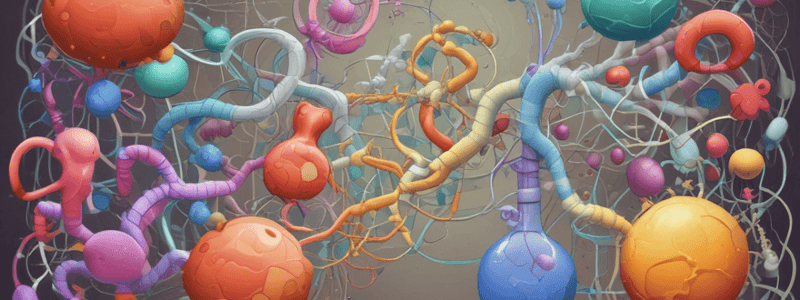Podcast
Questions and Answers
Explain the key role of Vitamin A in maintaining eye health.
Explain the key role of Vitamin A in maintaining eye health.
Vitamin A, particularly its beta-carotene component, is crucial for maintaining healthy vision.
Why is Vitamin A considered a fat-soluble vitamin?
Why is Vitamin A considered a fat-soluble vitamin?
Vitamin A is fat-soluble because it dissolves in fats and oils, allowing it to be stored in the body's fatty tissues.
What is the primary function of the B vitamins, and how do they achieve this?
What is the primary function of the B vitamins, and how do they achieve this?
The B vitamins primarily aid in the transformation of nutrients into energy. They act as coenzymes, assisting enzymes in facilitating metabolic processes that produce energy from food.
Based on the text, what is a significant reason for the growing market for B complex vitamin supplements?
Based on the text, what is a significant reason for the growing market for B complex vitamin supplements?
Signup and view all the answers
What is the primary reason for the popularity of B complex supplements?
What is the primary reason for the popularity of B complex supplements?
Signup and view all the answers
What is the specific role of thiamine (Vitamin B1) in the body?
What is the specific role of thiamine (Vitamin B1) in the body?
Signup and view all the answers
Describe the role of riboflavin (Vitamin B2) in red blood cell production.
Describe the role of riboflavin (Vitamin B2) in red blood cell production.
Signup and view all the answers
How does niacin (Vitamin B3) contribute to the health of the digestive and nervous systems?
How does niacin (Vitamin B3) contribute to the health of the digestive and nervous systems?
Signup and view all the answers
What are the two main categories of vitamins?
What are the two main categories of vitamins?
Signup and view all the answers
What is the function of thiamin (Vitamin B1)?
What is the function of thiamin (Vitamin B1)?
Signup and view all the answers
What is the function of vitamin C?
What is the function of vitamin C?
Signup and view all the answers
What are the symptoms of vitamin B6 deficiency?
What are the symptoms of vitamin B6 deficiency?
Signup and view all the answers
What is the function of vitamin D?
What is the function of vitamin D?
Signup and view all the answers
What are the symptoms of vitamin E deficiency?
What are the symptoms of vitamin E deficiency?
Signup and view all the answers
What is the function of vitamin K?
What is the function of vitamin K?
Signup and view all the answers
What is the function of riboflavin (Vitamin B2)?
What is the function of riboflavin (Vitamin B2)?
Signup and view all the answers
What are the symptoms of folic acid deficiency?
What are the symptoms of folic acid deficiency?
Signup and view all the answers
What is the function of niacin (Vitamin B3)?
What is the function of niacin (Vitamin B3)?
Signup and view all the answers
What role does Vitamin B6 play in the body?
What role does Vitamin B6 play in the body?
Signup and view all the answers
Why is Folic Acid important during pregnancy?
Why is Folic Acid important during pregnancy?
Signup and view all the answers
What are the benefits of Vitamin C?
What are the benefits of Vitamin C?
Signup and view all the answers
How does Vitamin D support bone health?
How does Vitamin D support bone health?
Signup and view all the answers
What is biotin commonly associated with?
What is biotin commonly associated with?
Signup and view all the answers
What is the main function of Vitamin B12 in the body?
What is the main function of Vitamin B12 in the body?
Signup and view all the answers
List two common types of Vitamin D supplements.
List two common types of Vitamin D supplements.
Signup and view all the answers
What functions does Vitamin E serve in the body?
What functions does Vitamin E serve in the body?
Signup and view all the answers
What is one of the benefits of Vitamin E as an antioxidant?
What is one of the benefits of Vitamin E as an antioxidant?
Signup and view all the answers
What is the current market size of the Vitamin E supplement industry?
What is the current market size of the Vitamin E supplement industry?
Signup and view all the answers
What is one of the primary functions of Vitamin K in the body?
What is one of the primary functions of Vitamin K in the body?
Signup and view all the answers
What are the two common forms of Vitamin K found in supplements?
What are the two common forms of Vitamin K found in supplements?
Signup and view all the answers
Why might someone consider taking a multivitamin instead of a standalone Vitamin K supplement?
Why might someone consider taking a multivitamin instead of a standalone Vitamin K supplement?
Signup and view all the answers
What other types of supplements may contain B vitamins?
What other types of supplements may contain B vitamins?
Signup and view all the answers
What is the total number of essential vitamins mentioned in the article?
What is the total number of essential vitamins mentioned in the article?
Signup and view all the answers
What is the primary focus of the research paper by TU, Chengjian et al.?
What is the primary focus of the research paper by TU, Chengjian et al.?
Signup and view all the answers
What are the three routes through which the amino pool is depleted?
What are the three routes through which the amino pool is depleted?
Signup and view all the answers
How does protein turnover function within the body?
How does protein turnover function within the body?
Signup and view all the answers
What is the role of albumin in blood plasma?
What is the role of albumin in blood plasma?
Signup and view all the answers
What distinguishes alpha globulins from other types of globulins?
What distinguishes alpha globulins from other types of globulins?
Signup and view all the answers
Describe the significance of the amino acid pool in nitrogen metabolism.
Describe the significance of the amino acid pool in nitrogen metabolism.
Signup and view all the answers
What are the primary functions of plasma proteins like globulins?
What are the primary functions of plasma proteins like globulins?
Signup and view all the answers
What percentage of blood proteins does albumin make up?
What percentage of blood proteins does albumin make up?
Signup and view all the answers
Explain how protein synthesis and degradation contribute to cellular protein levels.
Explain how protein synthesis and degradation contribute to cellular protein levels.
Signup and view all the answers
Study Notes
Amino Pool
- The amino acid pool is small, around 90–100 g, compared to approximately 12 kg of total body protein in a 70-kg individual.
- Three main routes deplete the amino pool: synthesis of body proteins, utilization of amino acids for nitrogen-containing small molecules, and conversion of amino acids into glucose, fatty acids, ketone bodies, or CO2 + H2O.
Protein Turnover
- Most proteins are continuously synthesized and degraded, allowing for the recycling of unneeded proteins.
- For many proteins, synthesis regulation determines their cellular concentration, while others maintain levels through selective degradation.
Plasma Proteins
- Plasma proteins, mainly synthesized by the liver, serve a variety of functions in the body.
- Major plasma proteins include albumin, globulins (alpha, beta, gamma), and fibrinogen.
Albumin
- Comprises approximately 60% of blood proteins.
- Essential for maintaining blood osmotic pressure, which regulates electrolyte and water balance.
Globulins
- More complex than albumin, with various subtypes including alpha and beta globulins.
- Alpha globulins include alpha-fetoprotein, a cancer marker.
- Beta globulins include components like transferrin and complement proteins.
Vitamins Overview
- There are 13 essential vitamins vital for human health, divided into water-soluble and fat-soluble categories.
- Vitamins cannot typically be synthesized by the body and must be obtained through diet or supplements.
Water-Soluble Vitamins
- Vitamin B1 (Thiamin): Important for carbohydrate metabolism; deficiency leads to nerve and heart issues.
- Vitamin B2 (Riboflavin): Key for energy production and lipid metabolism; deficiency causes skin and nervous system disturbances.
- Vitamin B3 (Niacin): Essential for cellular metabolism; deficiency leads to skin and digestive issues.
- Vitamin B6 (Pyridoxine): Involved in amino acid metabolism and neurotransmitter synthesis; deficiency results in neurological disorders and anemia.
- Folic Acid (Vitamin B9): Required for DNA synthesis and red blood cell formation; deficiency can cause anemia and neural tube defects.
- Vitamin B12 (Cobalamin): Necessary for amino acid metabolism and nerve function; deficiency results in anemia and gastrointestinal issues.
- Pantothenic Acid: Crucial for metabolic processes; deficiency leads to general weakness and fatigue.
- Biotin: Assists in metabolism; deficiency causes skin issues and hair loss.
- Vitamin C: An antioxidant involved in collagen synthesis; deficiency leads to scurvy and immune issues.
Fat-Soluble Vitamins
- Vitamin A: Essential for vision and immune function; deficiency leads to blindness and skin issues.
- Vitamin D: Maintains calcium and phosphorus levels for bone health; deficiency causes rickets in children and soft bones in adults.
- Vitamin E: Acts as an antioxidant; deficiency results in red blood cell breakdown and peripheral neuropathy.
- Vitamin K: Important for blood clotting; deficiency results in impaired coagulation and bleeding.
Vitamin Supplementation Insights
- Vitamin A market is expected to surpass $860 million by 2024, with many adults taking related supplements.
- B vitamins are crucial for energy transformation; the market is seeing significant growth due to the popularity of B-complex vitamins.
- Market for Vitamin C supplements is projected to reach around $9.8 billion by 2022.
- Increasing demand for Vitamin D supplements is linked to aging populations and expected to reach $2.5 billion in two years.
- Vitamin E supplements have a market of approximately $820.18 million, with caution advised for high-dose intake.
- Vitamin K remains less popular but is critical for health, with various forms available in multivitamins.
Studying That Suits You
Use AI to generate personalized quizzes and flashcards to suit your learning preferences.
Related Documents
Description
This quiz covers the dynamics of the amino acid pool in the human body, including its size and depletion routes, as well as protein turnover and its significance. Learn about the recycling of unneeded proteins and more.




